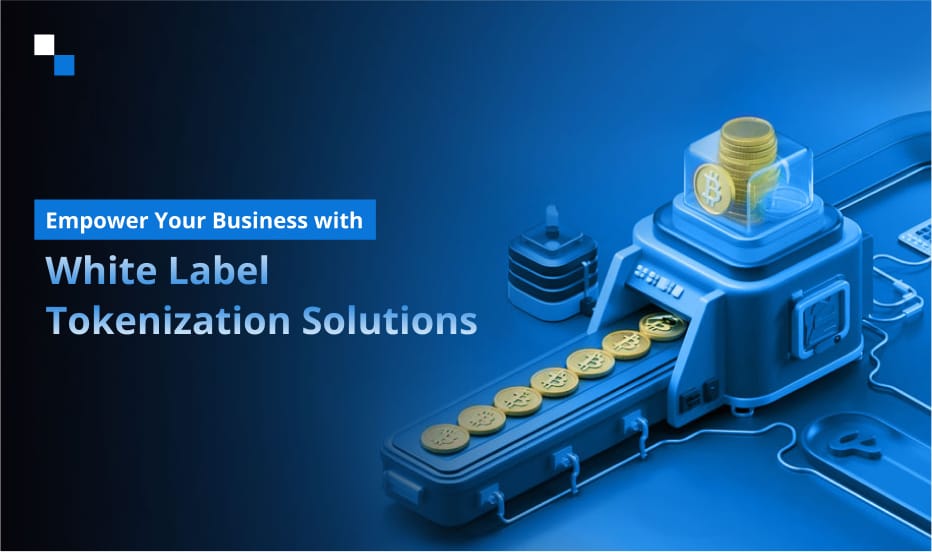Tokenization has been one of the most talked-about concepts in the blockchain and cryptocurrency space, with applications spanning from financial products to assets in various industries. However, businesses seeking to integrate tokenization solutions into their offerings often face challenges in building such platforms from scratch. This is where white-label tokenization platform development comes into play.
A white-label asset tokenization allows businesses to launch their own tokenization service without having to develop the underlying technology. The concept of “white label” means that the software can be rebranded and customized, allowing the company using it to present the product as its own, while the technical infrastructure is powered by a third-party provider.
In this blog, we’ll explore what white-label tokenization platforms are, how they work, the benefits, use cases, and the future of tokenization in various sectors.
What is a White Label Tokenization Platform?
A white-label tokenization platform is a pre-built, customizable solution that enables businesses to create and issue digital tokens backed by real-world assets like real estate, equities, or commodities. These platforms typically come with all the necessary features—token issuance, smart contract deployment, asset management, compliance tools, and more—already built in, ready for rebranding and integration into the client’s ecosystem.
Businesses can use these platforms to tokenize assets and offer tokenization services to their users without having to worry about the technical complexities involved in developing such a solution from scratch. Whether you’re a financial institution, real estate company, or even a start-up, white-label platforms allow you to quickly tap into the growing tokenization market.
Key Features of White-Label Tokenization Platforms
- Token Issuance and Management: A white-label platform provides businesses with the tools to create their own tokens, manage their lifecycle, and facilitate secondary trading. The platform typically supports various types of tokens, including fungible (e.g., utility tokens) and non-fungible tokens (NFTs), allowing for tokenization of diverse asset classes.
- Smart Contracts: Smart contracts are integral to tokenization, as they facilitate the rules and logic behind token issuance, transfer, and compliance. White-label platforms come with customizable smart contract templates that can be tailored to the specific needs of the business.
- Compliance and KYC/AML Integration: Tokenization platforms need to adhere to various regulatory requirements, especially in the financial sector. White-label platforms offer integrated Know Your Customer (KYC) and Anti-Money Laundering (AML) verification processes to ensure compliance with local laws and global regulations.
- Asset Backing and Auditing: The platform provides functionality to prove that real-world assets (such as real estate or equity shares) back the issued tokens. This typically involves auditing mechanisms and on-chain data verification to ensure the token’s authenticity and value.
- Wallet and Payment Integration: These platforms allow businesses to integrate wallets and payment gateways for token holders to store and transfer their tokens seamlessly. Some also support multi-currency wallets, enabling users to store tokens in various formats (e.g., ERC-20, ERC-721).
- Governance Features: Many platforms also come with governance features, where token holders can vote on decisions related to the project. This is particularly important in decentralized finance (DeFi) and tokenized investment vehicles.
- Security: Security is paramount in tokenization, given the risks of fraud, hacking, and data breaches. White-label platforms typically come with advanced security features such as encryption, multi-signature authentication, and secure smart contract protocols
Benefits of White-Label Tokenization Platforms
1. Cost and Time Efficiency:
Developing a tokenization platform from scratch is both time-consuming and costly. White-label solutions allow businesses to skip the technical heavy-lifting and launch their tokenization services quickly. This not only saves costs but also accelerates time-to-market.
2. Customization and Branding:
White-label platforms are highly customizable. Companies can rebrand the platform with their logo, color scheme, and unique features to make it align with their business model and market strategy.
3. Regulatory Compliance:
Regulatory frameworks around tokenization, especially in sectors like finance, real estate, and healthcare, can be complex and vary by jurisdiction. White-label platforms offer built-in regulatory compliance, including KYC/AML checks and audit trails, making it easier for businesses to operate legally.
4. Advanced Features:
White-label platforms usually come with the latest tokenization features, such as integrated wallets, support for various blockchain protocols, secure smart contracts, and tools for asset management. These features are continuously updated and maintained by the platform provider.
5. Scalability:
With white label tokenization solutions, businesses can easily scale their tokenization services. As the demand for tokenized assets grows, companies can add new tokens, integrate more features, and expand their offerings without worrying about underlying infrastructure.
6. Reduced Risk of Failure:
White-label platforms are generally more robust and have undergone extensive testing, making them less prone to bugs or failures compared to a new platform built in-house.
Use Cases of White-Label Tokenization Platforms
1. Real Estate Tokenization:
Real estate tokenization is one of the most prominent use cases. White-label platforms allow real estate companies to tokenize property ownership, making it possible for investors to purchase fractional ownership in real estate properties. This opens up the market to more investors while providing liquidity to traditionally illiquid assets.
2. Tokenized Securities:
Financial institutions can use white-label platforms to tokenize stocks, bonds, and other securities, making them accessible to a broader range of investors. Tokenization enables fractional ownership, lowering the entry barriers for retail investors.
3. Supply Chain Tokenization:
Companies can use tokenization to track goods and assets through the supply chain. By creating tokens that represent physical goods, businesses can ensure transparency, authenticity, and secure transactions throughout the entire supply chain.
4. Art and Collectibles:
The art and collectibles market is increasingly turning to tokenization, especially for high-value assets. Tokenization allows fractional ownership of artworks, enabling more people to invest in pieces of art while ensuring the integrity of the asset.
5. Decentralized Finance (DeFi):
DeFi platforms leverage tokenization to create decentralized financial products, such as tokenized lending, borrowing, and staking. White-label solutions can help DeFi protocols scale quickly, providing robust solutions for token issuance, liquidity, and governance.

The Future of White-Label Tokenization Platforms
As the world becomes more digitized and the adoption of blockchain technology continues to grow, white-label tokenization platforms are poised to become essential tools for businesses across industries. We are likely to see an increase in demand from industries such as finance, real estate, and healthcare, where tokenization can offer greater efficiency, transparency, and access to new markets.
- Impact on Traditional Industries: Tokenization has the potential to disrupt traditional industries by breaking down the barriers to entry, democratizing access, and providing liquidity to traditionally illiquid assets. For instance, in real estate, tokenization can make it easier for smaller investors to participate in high-value properties, while in finance, tokenized securities can reduce administrative costs and improve trading efficiency.
- Emerging Sectors: The growing interest in NFTs (Non-Fungible Tokens), digital art, and tokenized collectibles shows that tokenization’s potential extends beyond traditional industries. White-label tokenization platforms will likely expand their capabilities to include more asset types, such as digital art, gaming assets, and intellectual property.
- Blockchain Interoperability: As businesses increasingly move toward multi-chain ecosystems, tokenization platforms will need to support interoperability across different blockchain networks. This will enable businesses to issue tokens on various blockchains, such as Ethereum, Binance Smart Chain, and others, ensuring broader market access and flexibility.
- Regulatory Evolution: The regulatory environment surrounding tokenization will continue to evolve. White-label platforms that offer seamless compliance with global regulatory standards will have a competitive edge. Regulatory clarity will drive adoption across industries, particularly in traditional finance, real estate, and healthcare sectors.
Conclusion
White-label tokenization platform development represents an opportunity for businesses to offer blockchain-based tokenization services without having to develop the complex technical infrastructure themselves. By leveraging the features of these platforms, businesses can focus on building their brand, acquiring customers, and offering innovative products, while relying on a trusted provider for the technical backbone.
With benefits such as cost efficiency, ease of use, and scalability, white-label tokenization platforms are an ideal solution for companies looking to enter the rapidly growing tokenization space. As the adoption of blockchain technology increases, these platforms will continue to evolve, offering new functionalities and opening the door to a wide range of innovative use cases across industries.
If you’re considering launching a tokenization business or integrating tokenization into your existing operations, white-label platforms offer an efficient, scalable, and customizable solution to accelerate your growth and success in this dynamic market.








